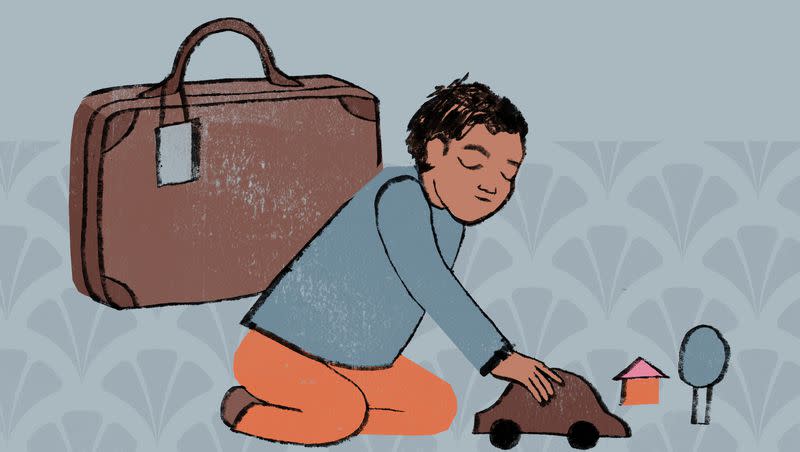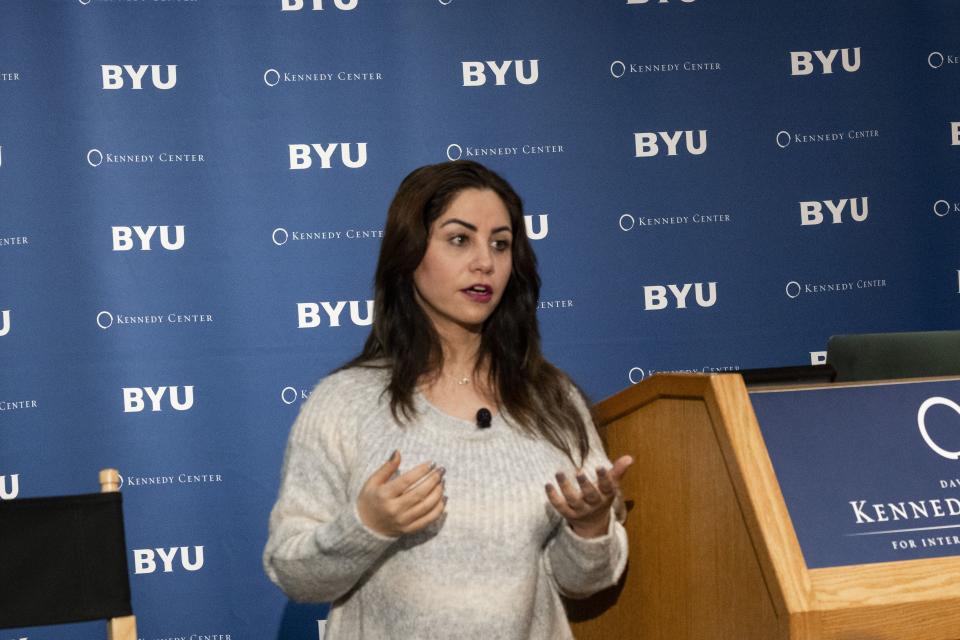Perspective: Don’t define people by the governments that oppress them

Siawash is one of the most poised and engaging 10-year-olds one will ever encounter. And from the looks of it, he enjoyed his visit to Provo when his mother spoke at BYU’s Kennedy Center last week. But Siawash’s biography begs a curious question: How could so many chaotic experiences be shoehorned into one short decade of existence?
Two and a half years ago, Siawash and his mother, Homeira Qaderi, boarded the last U.S.-bound flight out of Kabul as the Taliban descended on Afghanistan’s capital city in August, 2021. The United States was withdrawing its troops, and though U.S. officials predicted that the Afghan government would collapse in six to 12 months, it only took weeks for the Taliban to gain control of the country.
Siawash and his mother were lucky to get out when they did. But they did not leave unscarred. Even when the Taliban was hiding in the Afghan mountains for 20 years, injustice and inequity abounded in Afghanistan. These two former refugees reminded BYU students, with their presence and their words, of America’s responsibility to help those who have been forced to flee their homelands.
Qaderi had been invited to speak by BYU’s Kennedy Center for International Studies as part of its semester-long lecture series titled “Authoritarianism and Its Discontents.”
Elder Patrick Kearon, who was recently ordained a member of the Quorum of the Twelve Apostles, told Latter-day Saints in a 2016 general conference address that caring for refugees is not simply a nice thing to do but a responsibility of Christ’s disciples. Being a refugee does not define a person, Kearon said, but how we respond to a refugee’s plight “will define us.”

Qaderi was a young teen living in Herat, Afghanistan, when the Taliban first took power in 1996. “It took us a whole year to really realize what was going on,” Qaderi said during her visit to BYU. Girls could no longer go to school. The only place where women and girls could gather was in the public bath houses. Some women took this opportunity to organize a protest. Shortly thereafter, the Taliban threatened to kill any woman in Herat who walked the streets unaccompanied.
Related
Qaderi, who holds a Ph.D. in Persian literature from Jawaharlal Nehru University in New Delhi, is now an associate research scholar at the Council on Middle East Studies at the Yale MacMillan Center in New Haven, Connecticut. She was invited to Provo to tell BYU students about her experiences living under multiple oppressive regimes in Afghanistan. Many of those experiences are documented in her book, “Dancing in the Mosque: An Afghan Mother’s Letter to Her Son.” The book alternates between stories of her own youth and letters to Siawash.
As a young woman, Qaderi taught her peers to read and write even though educating females was forbidden. When the Taliban was forced out of power in 2001, life for women and girls got better. But the patriarchal and theocratic norms of Afghan society persisted even under the new government. Qaderi entered into an arranged marriage from which she was later able to get a divorce, although it is rare for an Afghan woman to procure a divorce on her own volition. However, she was unable to see Siawash for more than two years until she finally obtained custody of him.
Today, Qaderi exudes a sense of gratitude and relief. She is happy to have her son safely by her side. But the burden of inequity did not disappear on the plane ride to America, and professional accolades cannot erase the stain of injustice. As such, she’s not looking for fame or fanfare, but help for Afghan refugees, especially the girls. “Please,” she said. “Let them into your colleges. Help them learn English.”
Refugees should not be destined for a life of dependent victimhood. We need to move past the notion that people coming from war-torn nations come with inherent baggage or dysfunction. People are not defined by the governments that oppress them. But as Elder Kearon said, we will be defined by how we treat the refugees who reach out to us for help.
After his mother finished addressing the BYU students, Siawash smiled as he told me of his plan to watch as many movies as possible on his flight back to New Haven. This would be a far less stressful experience than his flight out of Kabul. In many ways, Siawash is just like every other fun-loving 10-year-old. But beneath his cheerful countenance lies an astute understanding that not all 10-year-olds can smile so freely, as their hope and dreams are oppressed by the forces that bear down on them.
Addison Graham is a senior at Brigham Young University and a student scholar at the Wheatley Institute.

